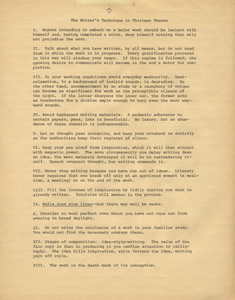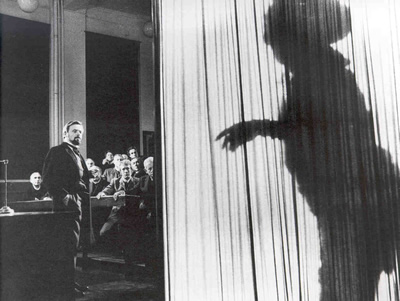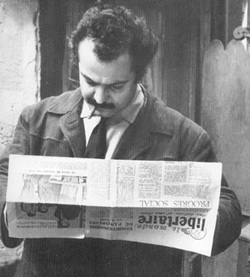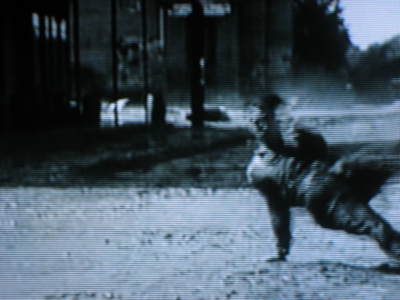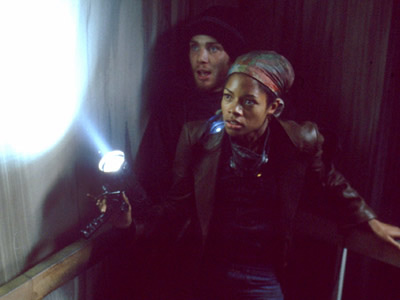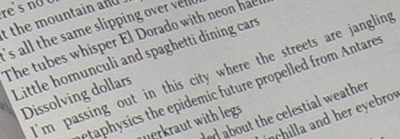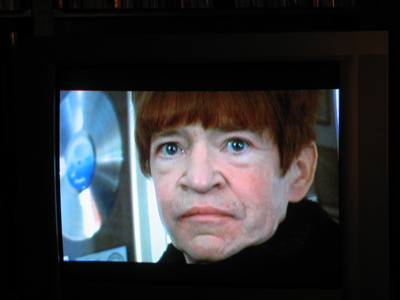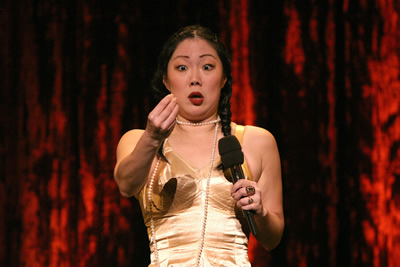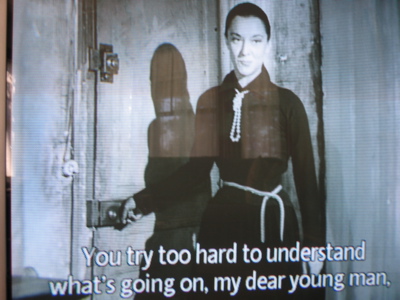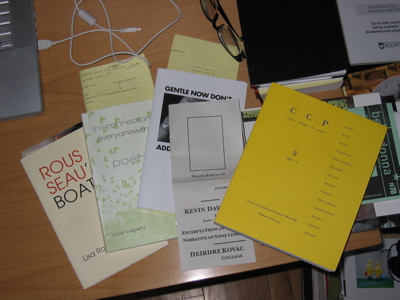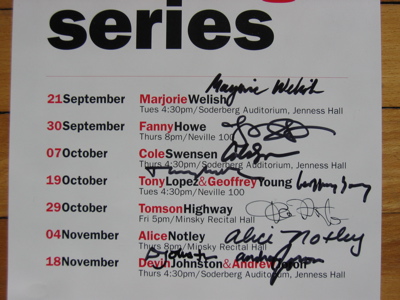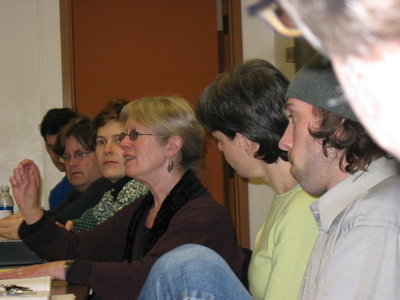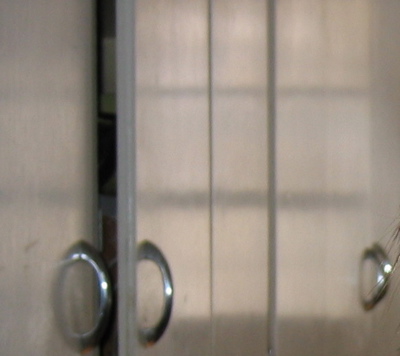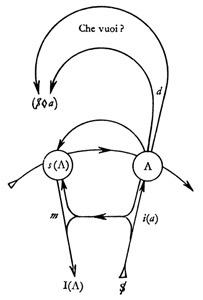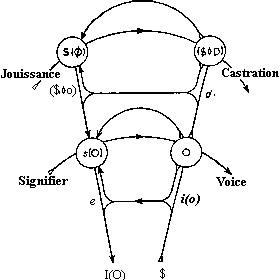
"It is very likely that nearly every one has been very nearly certain that something that is interesting is interesting them" — Gertrude Stein
30 August —permalink
§ Screen memories: The Towering Inferno (dir. John Guillermin and Irwin Allen, 1974). By the time I sat down to watch, the swank party was already being ordered to disperse by butch fire chief Steve McQueen. Lots to be amused by and wry about, especially if you haven't seen it since you were nine (which I was the summer of its release). But the most consistently funny bits are those the principals spend, in situations of supposedly mounting urgency, chatting on dainty telephones to one another. • It reminds me of the several scenes of The Women (dir. George Cukor, 1939) I happened to glimpse a few days back. It seemed each time I looked, a phone call had just come in for one fabulous diva or another: those black cones propped at the ear, the mouthpiece held close to the lips, the awkward silences in which the men on the other end said or failed to say something life altering. Phoning it in, like they say. • I dropped $20 on one of those iTalk mics that Apple is forcing to remain shitty out of fear of bootlegging. Let it run while we watched the Inferno, to see how it would handle a long file. Listening later to just the dialog, soundtrack, and living room banter made me long for Mystery Science Theater 3000. • Annoyingly, there was tons of what John Vanderslice has usefully termed pixel revolt, especially in the quicker passages. What does Adelphia do will all the money I send them every month? Nevermind.
29 August — permalink
§ One hit wonders: "The best evidence for this account is Tynnichus from Chalcis, who never made a poem anyone would think worth mentioning, except for the praise-song everyone sings, almost the most beautiful lyric-poem there is, and simply, as he says himself, 'an invention of the Muses.' In this more than anything else, then, I think, the god is showing us, so that we should be in no doubt about it, that these beautiful poems are not human, not even from human beings, but are divine and from gods; that poets are nothing but representatives of the gods, possessed by whoever possesses them. To show that, the god deliberately sang the most beautiful lyric poem through the most worthless poet. Don't you think I'm right, Ion?"
§ Techniques of abbreviation: "Here is a model of abbreviation; the whole technique is reflected in it: Her husband abroad improving his fortunes, an adulterous wife bears a child. On his return after long delay, she pretends it begotten of snow. Deceit is mutual. Slyly he waits. He whisks off, sells, and—reporting to the mother a like ridiculous tale—pretends the child melted by sun.... " (from Geoffrey of Vinsauf's "Poetria Nova," ca. 1200).
§ Poetry blogs: Happy to stumble upon Rue Hazard. • Capitalism nibbled daintily at my syntax. • We all freewheelin' outlaws, but not. • Mark at Culture Industry gives the full text of Benjamin's Post No Bills from One-Way Street. Before I owned my first computer, I typed out the theses (click to enlarge image below) to have them always near. They still hang on the back of a door in our house, getting truer, more funny and more devastating, as the years of writing add up slash take their toll.
§ Screen memories: Company: The Original Cast Album (dir. D.A. Pennebaker, 1970). Here's a good idea: leave "The Ladies Who Lunch" until 4am, when Elaine Stritch is sure to be fresh and sober. Sondheim is amazing with the singers, calmly correcting pronunciation ("say goody") and restoring notes that have been unconsciously revised by the performers during the show's run. • The Elephant Man (dir. David Lynch, 1980). Very belated first viewing of this astonishing film. Lynch has never been this good again, frame for frame. Or commanded such a cast. • The Silence of the Lambs (dir. Jonathan Demme, 1991). Continuing a mini-Hopkins festival, and on the commercial-laden Spike! channel no less. Even with the fear all drained out of it by familiarity, the small screen, censorship, the film holds its interest, due mostly to Foster's performance.
20 August — permalink
§ Linkology: Stunned to see that Swoonrocket, Juliana Spahr's reading diary, has been online for a year without my finding it until this morning. • Other recent additions to the poetry links: Lavamatique, Amy King, Girish, and Reli[e]able Signs. • Following a link from Girish, found Flickhead. And on a tip from Mudd Up, added downtempo devotée Properly Chilled. Also updated the link to Honey, Where You Been So Long.
§ Screen memories: Georges Brassens, J'suis de la mauvaise herbe (dir. Alain Poulange and Guillaume Vincent, 2001; on TV5). • Saturday Night Fever (dir. John Badham, 1977). • All but the floor show of Rocky Horror Picture Show (dir. Jim Sharman, 1975).
17 August —permalink
§ Poetry blogs: Here's a glimpse of what Kasey's up to in San Francisco (caption anyone?), while Rodney shakes the Limetree with his appreciations of Kevin Killian and Michael Gizzi. Even when Stephanie neglects to nourish the moon, her flickr account remains the photo album I most like to leaf through in hopes of seeing what friends, and photogenic strangers, are up to. • At Equanimity, vacation is making Jordan really meta: witness this reluctant post on reluctant posters. I can't determine if Jordan is supposed to be Lacan or the analysand in the next graf. In any case, practicing amateur psychoanalsysis on people one doesn't know has it hazards, as Nada pointed out a while back. But I kind of admire Jordan for rushing in (or thinking to rush in, then thinking better of it, then...) where angels dare not, etc. • I forwarded a link to Michael Nicoloff's thoughtful post (at the interesting and new to me I Am Yer Grammar) about Invective Verse to the author, and shot her e-mail address to him. Those Maine to Brooklyn hotlines are always open.... • Franklin deficit spends his cultural capital with a list of works neither read, purchased, or received. • And when the blogs are slow (which the poetry blogs always are), it's just as Ron Padgett here describes (update: just noticed that Laura Branigan fan Emily Lloyd arrives at a similar analogy in the comments box to Shannon's post.). • "Excellent. Things are shaping up well. Keep at it" (or: sunflower, you are not a sunflower, you are a harbinger of revolutionary violence). • Drew's got notes to John Godfrey's Private Lemonade at Overlap. I was just listening to "Pouring Gulf" this morning, along with Perelman's "Revenge of the Bathwater," Wieners's "The Legends of Garbo and Dietrich," and other poems that take turns with the measly 320 tracks on the iPod (as I write, Paul Dutton fades in and sets about fluttering his vocal folds in "Shut My Mouth," from the amazing Mouth Pieces).
15 August — permalink
§ Poetry blogs: First the kind inmate at the croissant factory tips me to Tom Raworth's blog, at which I get to hear Paul Anka swinging through "Smells Like Teen Spirit," and then Rodney Koeneke steps in for Kasey (who has been the undisputed king of summer content, no?) with a great post on mystique management at Limetree. Links duly updated. (I am acting like Hotel Point is exercising the French right to a fermeture annuelle, and that the rentrée will follow, endless and, by Kent and Jimmy at least, indestructible.) Oh, and thanks to Joshua for his carefully worded defense of carelessness, insouciance, saying shit. He's right of course, though I doubt I'll ever overcome my socialization (is that the right word for what made me recognize something I agreed with in that passage from Flaubert that seemed to so upset the budding blog nationalists in 2003?) enough to bulk up my column inches per annum.
14 August — permalink
§ Screen Memories (mid-July to mid-August): Alice (dir. Woody Allen, 1990): better than the innumerable films constituting his really depressing shitty streak, and better too than the memory I'd retained from its release, but for all that, not truly good. • Twelve Monkeys (dir. Terry Gilliam, 1995): because 28 Days Later put me in mind of it; not disappointed. • The Children's Hour (dir. William Wyler, 1961): I'm agnostic re: Audrey Hepburn, but I liked this film (and her in it) very much; the brat who outs her teachers is better than anything in the Wonka films. Family resemblance to The Group, though better. • Back to the Future (dir. Robert Zemeckis, 1985): first full viewing, despite the culturally mandated clips and bits caught on cable; main attraction: Christopher Lloyd; and Zemecki's swerve around son-with-mom incest is, uhm, convenient (her: "I just feel like I'm kissing my brother or something"). • Edgeplay: A Film about the Runaways (dir. Victory Tischler-Blue, 2004): encore avec le scuzzy Kim Fowley, and lots of vintage resentments; Joan Jett apparently unavailable for comment. • Dogtown and Z-Boys (dir. Stacy Peralta, 2001): Trackers, Bones, and an Alva were my idea of heaven in eighth grade; this film (also with its vintage resentments) explains why. • Sideways (dir. Alexander Payne, 2004): though she's saddled with the name "Maya" and a correspondingly crippling speech at a turning point in this pretty forgettable film, Virginia Madsen still spends the duration seeming like she's in a better movie than the jerks surrounding her; Thomas Haden Church is in the bad film, but he's dead on as a guy one knew at SDSU, now all (not) grown up. • The Uninvited (dir. Lewis Allen, 1944): if Nick and Nora Charles were siblings, they'd react to some melodramatic haunting with similar nonchalance; by the curtain, the ghosts are laid to rest, and the principles are just plain laid. Nifty. • Ministry of Fear (dir. Fritz Lang, 1944): along with the Kubrick I'm about to mention, the only great film in the batch. TimeOut's capsulator gets the gist of it here. • Paths of Glory (dir. Stanley Kubrick, 1957; image gallery here): Timothy Carey is a proto-beatnik trip, Kirk Douglas is stiffly and bullet-proofédly perfect, the scarred and scarring George Macready is vile as they come, and the ending, well, one hopes; in any event, every frame is worth staring at. • La Cage aux Folles (dir. Eduoardo Molinaro, 1978): for Michel Serrault's Albin.
11 August — permalink
§ A few days ago, Joshua over at Sugarhigh! took the time to record his impatience with the search-engine assisted narcissism of poets, linking it to those low-info blog notations like "I read x today" or "x fell through the mail slot today," which to his mind succumb to "the Googlogic of valuation based on sheer mention" and stifle the "originary thrill" of blogger-brand wild analysis in favor of the mute accumulation of "cultural capital." It is good to have such vexations so articulately voiced. Good also to be asked: "If one isn't going to take the time or risk to love it or hate it, or to imagine ways of reading the book and letting the book register its world, why mention the book at all?"
My practice at Third Factory has been to include the reception and reading of books on the site as a way of providing context for the more substantive critical work I am occasionally able to do. As I mention below, I initially thought that work would take the form of a regular column that would continue the e-mailed "Notes to Poetry" in a web format. Because I've so far been unable to hit upon the rhythm and mode of address that would make such a column possible, most of the work for which Third Factory provides a background happens off-site, either in the pages of The Poker, or in reviews and articles here and there. This bugs me, but not enough to shut down the shop.
I avoid evaluative commentary in most daybook entries in part because I'm not quick-witted enough to write something subtle and pithy the moment I put a book down. (My sense of Joshua is that he has those chops, the lucky devil.) I often do have something to go on after a single read, but it seldom is articulate or reliable until about the third. And that's another problem: I wish I were better at getting to that third read more often. Usually it takes an editor's request to get me there in an accelerated fashion. More typically, it'll be about five years in the making (for a book I'm interested in; I almost never get there with a book I'm bored by).
As to displays of "cultural capital," I don't know. J'adore Bourdieu, but not to the exclusion of Habermas. That is, I think communicative action, not primarily oriented to profit or dominance, happens more often than Bourdieu's exaggerated insistence upon "strategic action" allows. Is it possible that someone arranged the books on their coffee table expressly so that I would extract the "meaning" of their social status from the conveniently provided clues? Totally. Does that mean that every stack of books is so designed? Not in my experience, especially not with poets. Nor does the desire for recognition, one of the more complex and interesting desires, reduce down to sifting through google results for signs that one (or one's work) exists.
And then there's taste: hated it, loved it. As Barthes writes: "I like, I don't like: this is of no importance to anyone; this, apparently, has no meaning. And yet all this means: my body is not the same as yours. Hence, in this anarchic foam of tastes and distastes, a kind of listless blur, gradually appears the figure of a bodily enigma, requiring complicity or irritation. Here begins the intimidation of the body, which obliges others to endure me liberally, to remain silent and polite confronted by pleasures or rejections which they do not share."
Anarchic foam, glimpses of bodily enigma, obliging others to endure us: Joshua's right, it puts one in mind of the best (and worst) of the blogs.
(For Jordan's response, check here.)
1 August — permalink
§ Site Note: As a way of better acquainting myself with the wonderful resource that is PENNSound, I'll be posting listening notes to poetry soundfiles throughout August here.
30 July — permalink
§ Site Note: Working offline, in Netscape Composer, just trying to get a feel for the medium, I made the first entries to a Third Factory daybook four years ago on July 30, 2001 (no anchors, so it requires a bottomsward scroll to get there). That week I was reading Adeena Karasick, Linh Dinh, the fifth issue of The Germ, and Juliana Spahr's chapbook Dole Street. I'd also just begun reading Emmanuel Hocquard's massive book of poetry and poetics, ma haie, which has been a source of delight and instruction for me ever since.
I never have managed to write the regular column around which this project was to have turned in my initial conception and that lends a subjective air of the inachevé to my metaphorical factory work. On the "objective" side, I sometimes hear from others that the site's organization is quirky and hard to navigate (suggested remedies always welcome). But at least it has kept me in touch with the one big poetry union that I joined with pleasure in the mid-1980s and that has supplied me with contentious comaraderie ever since. Like Schuyler says: "I salute that various field."
19 July — permalink
§ The Nation double issue of 18 and 25 July includes a dozen pages in a row that are as good as the magazine gets: Lisa Duggan and Richard Kim on gay marriage, Mike Davis on the H5N1 strain of avian flu, Amitav Ghosh on Abu Ghraib one year after the photos broke, and John Palattella's masterful review of Adam Kirsch's The Wounded Surgeon.
§ Stumbled upon an unexpected film project while researching the actress who plays Fanny Price in Patricia Rozema's only mildy interesting adaptation of Austen's Mansfield Park (see below): Frances O'Connor is slated to play Laura Riding in Poetic Unreason, said to be currently in post-production. The IMDb plot summary reads: "James D'Arcy stars as Robert Graves, the British poet who becomes obsessed with his new lover, Laura Riding, as his own marriage lays dying."
§ Screen memories: The Name of the Rose (dir. Jean-Jacques Annaud, 1986); The Exterminating Angel (dir. Luis Buñuel, 1962); Charlie and the Chocolate Factory (dir. Tim Burton, 2005); Willy Wonka and the Chocolate Factory (dir. Mel Stuart, 1971); Mansfield Park (dir. Patricia Rozema, 1999).
8 July — permalink
§ The pace of the movie is like a horse dragging a heavy cart. Inside the cart is everything we think we know. Things start falling off the cart, though, until the end, when the cart is light enough again to turn into a train. • A music that intends so great a surplus of joy that listeners fall down crying. • Le vainqueur d’une rue à calcul voisine vous somme de rejoinder la même troupe poissonnière dès que sa raquette marquera le premier point. • The delivery mechanism is often clogged with rage. And the salvation of this exchange is understood to be futile. Current technologies of heart and synapse permit only outgoing messages, while the life of the letter-writer depends on a response. • A little window into a potential poetic energy liberation policy. • Bodily presence is optional.
6 July — permalink
• Midday at midweek (blogs): Antlers. Fidgetglyph. Pungent Structure. Knuckling Under. Folding Ruler Star. Steel plate of stupid busy. Not being mercurial and witty. A yuppie urban elite being devoured where they shop and show off. Is it then my fault that the palsy of my affections benumbs my whole life? Teasing, criticism, sarcasm, insults.
• Phenomenology of 1981 (Aetat. 16): Gelling. Scamming. The phone. Minimum wage. Punk (T.S.O.L., Black Flag, China White, Dead Kennedys, Bad Religion, KNAC, Rodney). At home in homophobia, racism, sexism. Class hatred.
• Screen memories, 10 June - 5 July: The Big Sleep (dir. Howard Hawkes, 1946); Gallipoli (dir. Peter Weir, 1981); What's Eating Gilbert Grape (dir. Lasse Halström, 1993); 28 Days Later... (dir. Danny Boyle, 2002; image below); Beautiful Thing (dir. Hettie MacDonald, 1996); The Group (dir. Sidney Lumet, 1966); A Room with a View (dir. James Ivory, 1985); Soylent Green (dir. Richard Fleischer, 1973); Westworld (Michael Crichton, 1973); The Piano (dir. Jane Campion, 1993); Steamboat Bill, Jr. (dir. Charles Reisner, 1928; image above); Close Encounters of the Third Kind (dir. Steven Spielberg, 1977); Torch Song Trilogy (dir. Paul Bogart, 1988).
29 June — permalink
• Accuracy, eye contact, volume, and understanding.• "...I think poets should be imperialists; I think they should be importers; I think they should be exploiters of external experience, without apology. I don't see that kind of thinking very often in the poetry world."
• Patience and impatience.
18 June — permalink
Attention Span: Call for Participation — As the mid-year mark approaches, readers of Third Factory are once again invited to participate in a collective charting of the contemporary poetic field. Each contributor is asked to provide a list of up to eleven titles (poetry and otherwise, recent and rediscovered). Brief comments are also welcome (but not required). Please contact me at this address for guidelines on formatting. Earlier editions, which receive a fair amount of traffic all throughout the year, can be seen here. Deadline for inclusion is July 20, 2005.
Late May, early June — permalink
Several weeks of mostly pleasurable absorption in the work of composing another set of "Field Notes" for the Poker, issue six of which can be expected shortly after Bloomsday.
Other reading: Miss Julie by Strindberg. • Transcripts of Adorno's 1959 lectures of The Critique of Pure Reason (a lecture a day); also his essay on Siegfried Kracauer ("The Curious Realist") in Notes to Literature. • Horace's Ars Poetica in D.A. Russell's prose translation. • Edith Grossman's translation of Don Quixote (a chapter an evening, ad libitum). • Edith Wharton's House of Mirth (begun). • Randall Collins's fat study of The Sociology of Philosophies (opening three chapters). • Recent issues of Artforum, Bookforum, Boston Review, London Review of Books, NYRoB (Didion on Schiavo), TLS and the usual news sources (NYT, Economist, Political Theory Daily website, Wallerstein's bi-weekly bulletins).

Screen memories: The Golden Ring: Sir Georg Solti (dir. Humphrey Burton, 1965). • Three by Linklater: Before Sunrise (1995), Before Sunset (2004), and Waking Life (2001). • Seconds (dir. John Frankenheimer, 1966; still below left). • I'm Not Scared (dir. Gabriele Salvatores, 2003; still below right). • Mens' semi-finals of the French Open (Nadal def. Federer). • Episodes of Queer as Folk (fifth and final season) as they air.

25 May — Wednesday — permalink
§ Journey into Fear | Dir. Norman Foster, 1942 | Feat. Orson Welles, Dolores del Rio, Joseph Cotten | 68min TCM | IMDb
24 May — Tuesday— permalink
§ Phantom of Liberty | Dir. Luis Buñuel, 1974 | 104min | Criterion Collection 290 | IMDb | Obscure commentary in Jacket 2
23 May — Monday — permalink
Nonredemptive surrealism, coming after, and coming off it (poetry blogs): An extraordinary meditation on Broken Constructivism: Luis Buñuel's Los Olvidados at David Hess's Heathens in Heat. • Hotel Point peruses Alice Notley's new book of essays, Coming After. • Cahiers de Corey: "To 'Come off it' (with an implied exclamation point) is indeed the specialty of the New York School; it might be the secret subtitle of Frank O'Hara's 'Personism.' And it might also be the motto of The Hat, which I'm reading now for the first time. One major and notable exception so far is Joshua Clover's piece, 'At the Atelier Teleology,' which though tongue-in-cheek stills strikes me as having highfalutin' aspirations toward the Big Statement, Big Poemness, 'Mastery'—in short, 'IT.' Which does not in fact strike me as a bad thing; which seems even a tonic in the midst of the delightful, bird-witted, sometimes energetically vulgar, always hyperintelligent, 'come off it' poems surrounding Clover's piece."
Late April, early May — permalink
Screen memories: All About Eve (dir. Joseph L. Mankiewicz, 1950), Los Olvidados (dir. Luis Buñuel, 1950; still below), Nazarín (dir. Luis Buñuel, 1959), Imitation of Life (dir. Douglas Sirk, 1959), Annie Hall (dir. Woody Allen, 1977). The Ox-Bow Incident (dir. William A. Wellman, 1943).
16 May — Monday — permalink
• Another Site Note: Finally got around to a sorely needed updating of the poetry links today, and also connected some dots between the works received and the daybooks. Added three new works to the constellation page as well. I've never gardened, but the manner in which little things always need doing on a website makes me think of that activity. Hard to imagine that I've kept it up for four years, all for the sake of a few things that would have grown wild anyway.
• Pam Brown and John Tranter announced Jacket 27 today. There's a secret pocket sewn into the lining of that elegant and capacious garment in which you'll find a few manifestly inadequate words on Lisa Robertson's Nomados chapbook Rousseau's Boat.
10 April — Sunday — permalink
• Site Note: Updated the ensemble, daybook, and constellation pages. Like Walter Benjamin says in "The Writer's Technique in Thirteen Theses": "Nulla dies sine linea—but there may well be weeks."
27 March — Sunday — permalink
• Screen memories: The Mayor of the Sunset Strip (dir. George Hinkenlooper, 2003). The Kid Stays in the Picture (dir. Nanette Burstein and Brett Morgen, 2002). Napoleon Dynamite (dir. Jared Hess, 2004). CHO Revolution (dir. Lorene Machado, 2004). Orphée (dir. Jean Cocteau, 1949).
20 March — Sunday — permalink
• Théorie des tables (first in a series, perhaps): work desk, circa 11am, slightly fanned out but otherwise unmanipulated. Now if only I could commission Manny Farber....
• I'm with Mika on both these crushes. And also mightily relieved to be released from the third season of 24, which I finished watching on dvd Friday. Even when I thought the baby she brought into CTU was a viral vector, I still liked Chloe. And as the season progressed, her version of Coleen Rowley-like rules following, her great vocal pacing and scrunched up facial gestures, her terrific non-taste in clothes, all added up to a distinctive character.
March 19 — Saturday — permalink
• Autography: In more than ten semesters of organizing the New Writing Series, only once have I had the wits to get all the participants to sign the poster:
March 16 — Wednesday — permalink
• Sitting in on Carla Billitteri's graduate seminar on poetics, with guest Lyn Hejinian:
11 March — Friday — permalink
• Inframince studies, portraiture (cont'd): Jennifer Moxley's presence in the photo detail below is inframince.
• Further studies in inframince at Hotel Point (scroll down): inframince-meat, inframincingly.
• "When one day at last they come to storm your deluxe cubicle" (cont'd): Lime Tree seeks inclusion on the enemies list.
10 March — Thursday — permalink
• State of exception (cont'd): Mosses from an Old Manse points to Disappeared in America, an online companion to an exhibition at the Queens Museum of Art.
• Joshua Corey's eloquent response to Alyssa Lappen's March 4th attack on Ammiel Alcalay raises an interesting question concerning strategy: should one attempt to reason with organizations (and delegates thereof) that repeatedly demonstrate contempt for rational discourse? As the right-wing stigmatizing machine becomes more elaborate, and the consequences of stigmatization more urgent, it will be important to have in place effective means of intellectual self-defense. What will those look like?
9 March — Wednesday — permalink
• Need, demand, and desire (cont'd): I decided to check my recent loose talk about Lacan, desire, and pop songs against his 1960 lecture—originally delivered at Royaumont—on the "Subversion du sujet et dialectique du désir dans l'inconscient freudien" (Ecrits II, Paris: Seuil, 1971: 151-191). It's difficult going, as I recall from my very first attempt at the translation (spindly note at top of the first page indicates that was January 13, 1989), but reading it in a Duchampian spirit (Lacan's graphs as notes for his own Large Glass?), I actually managed to enjoy myself.
• Fish hook, bottle opener, question mark: three shapes Lacan finds in his "che vuoi" graph. But the completed graph—as others must have noticed by now—looks very like an old style parking meter. The way I see it, the coin drops right into the "tresor du signifiant," and the dwindling time—reversing the vector from voice to signifier—is that of the analytic session.
• (The food court at) Big Rock Candy Mountain (cont'd): I can't imagine why Konvolut K wished to traumatize me so, but I've now visited a Hootie-narrated wonderland where breasts grow on trees and buckets of, um, dressing spill freely as purple onion hula hoops spin and cheerleaders give free, um, shaves. I hadn't known that there was a king who wanted me to have it my way, until now. Regicide does spring to mind.
• As The Crowd, I'm pretty sure (no lyric sheet anywhere) conclude: "It just goes to show you that the world is shit." Where "it" can be almost anything.
• The advertisement does call attention to the curious absence of libido in the original song. Alchohol, cigarettes, and laziness in abundance, but not a woman in sight. Or have certain verses been dropped from the version I know?
• The voice: "And why is the right, last part of the vector of the signfier S-S' —the part subsequent to the point de capiton — designated as 'voice'? To solve this enigma, we must conceive the voice in a strictly Lacanian way: not as a bearer of plenitude and self-presence of meaning (as with Derrida) but as a meaningless object, as an objectal remnant, leftover, of the signifying operation, of the capitonnage: the voice is what is left over after we subtract from the signifier the retroactive operation of 'quilting' which produces meaning" (The Sublime Object of Ideology [London: Verso, 1989]: 104).
• Conceptual (dis)integration network (cont'd): "The picture is like a memorial drawn by an infant with a classical education who can barely write..." (Arthur C. Danto on Cy Twombly's 1983 painting "Anabasis" in the 21 March 2005 issue of the Nation).
• More convincing than the "cogito" are the words inscribed on Duchamp's grave: "D'ailleurs, c'est toujours les autres qui meurent" ("Besides, it is always the others who die").
7 March — Monday — permalink
• Need, demand, and desire (or, Lacanian pop, cont'd): The structural exclusion of an agent (rabbit) from the satisfaction of its desire for a thing (Trix) serves to interpellate a class of agents (kids) whose desire, being satisfiable, makes them smug ("silly rabbit"). Only the rabbit doesn't know that the whole universe has been arranged specifically to preclude the satisfaction of his one desire.
• Need, demand, and desire (or, Lacanian pop, cont'd): Woke this morning humming "Big Rock Candy Mountain," which inverts the Silly Rabbit scenario by describing a place where everything has been arranged specifically to facilitate the satisfaction of a hobo's needs and desires. I'm especially interested in the sacrifice that seems to have brought about this paradise: "I'm a goin to stay where you sleep all day / Where they hung the jerk that invented work / In the Big Rock Candy Mountains."
6 March — Sunday — permalink
• Adoption and its progeny (cont'd): A heterosexual couple about to adopt a two-year old boy from Kazakhstan is instructed to arrive with about ten grand in fresh clean US currency (hundreds I think they said).
• Cerebral jukebox (cont'd): The Crowd's "Silly rabbit / trix / trix are for kids" drowns out The Postal Service song about wanting badly to believe that "there is truth and love is real." An interiorizing burn now twenty years old (Huntington Beach, towards the end of High School—if I'm placing it correctly), itself a parasite on the jingle known since the dawn of consciousness, thus displaces a recent, more ambivalent burn. As delegated speech, the Postal Service lyric is held in low esteem by my ego. But maybe its the unconscious dropping nickels into the machine just now? And what would its investment in such rank sentimentality be, exactly?
• Need, demand, and desire (or Lacanian pop, cont'd): "I always thought of the 'valley low' as being filled with thickets, bogs, quicksand, snakes, etc.—worse than the mountain, even. As in 'so wide you can't go around it, so low you can't go under it.'" Already agape with admiration for Peter Culley's richly-articulated charting of erotic topography, I experience a surplus frisson at his sly invocation of the même meme in "worse than the mountain, even."
• Lincoln-Wilson Effect (cont'd): Commission a Wilson-Lincoln Effect for the largest radiator in the house? But who of? (Suggestions welcome.)
• The tributes to Susan Sontag in Artforum make me think of the evening in Paris—perhaps the sole snowy one in the eighteen months I lived there—on which we trudged out to view several reels worth of Andy Warhol's screen tests. Among the many responses to the Factory formula (three minutes of stationary camera time during which subjects were instructed to remain still), Sontag's performance stands out for its giddy inability to remain still, or serious, or even in frame. Against all the talk of her "seriousness," one should also place what this screen test silently captured: a winning willingness to succumb to a fit of giggling, même.
• Inframince studies, zoological-architectural (cont'd): When the frightened mouse wedges itself into the crevice between stove and cabinet, the wiggle room remaining is inframince.
• Inframince studies, olfactory (cont'd): At Mikarrhea, the scent of Greta has dwindled to inframince.
3 March — Thursday
• Read Drucilla Cornell's "Adoption and Its Progeny," from the collection Adoption Matters: Philosophical and Feminist Matters, ed. Sally Haslanger and Charlotte Witt (Ithaca: Cornell, 2005): 19-46.
• Cornell's anarcho-Lacanian argument for "the equal protection of the imaginary domain" goes like this: "we need not only actual physical space, but also psychic space in which to struggle to become a person. The individual, not the state, should be the normative 'master' of this kind of struggle in which we seek to make sense of the identifications that make up who we are" (26).
• Acoustics of enclosed commercial environments (or, unlidded ear, cont'd): even after assigning some focused attention to the task (zoning out from group conversation to do so), I can hardly pick out a single signified in the lyrics of a completely familiar tune. Finally, sheer redundancy enables a (correct) guess: it's Groove Line. At the same restaurant, I catch a guitar passage from a Rod Stewart song that sounds like a passage from Pink Floyd's "Wish You Were Here," a song I now think was "Fire" by the Ohio Players (but I distrust my memory as I write this), the woozily sex-dependent hook of "You are a magnet / and I am steel," the one-two punch of "Boogie Nights" and "Funky Town," a moment toward the start of "Never Known Love Before" that I mistake for Duran Duran, and, as we depart, the ever-rousing "Barroom Blitz."
• Wallace Stevens, transgressor of the heteronormative family: To the bumper stickers that read: "Marriage = [urinary segregation sign for "man"] + [urinary segregation sign for "woman"]" we could add a [silhouette of a blackbird]: "A man and a woman and a blackbird / are one." Of course, once blackbirds are in, all forms of alterity flip from inexcusable to inexcludable.
• Delays not in glass (cont'd): The year old child in the jpg has one brown baton-like object in her left hand as she gnaws at the end of a matching baton-like object grasped in her right. For the first time in years, I think the word "numchuck," wrongly.
• Bachelors, brides, and delays not in glass (cont'd): Growing up, the eldest boy in a working-class family comes especially to treasure two objects, a set of leggos and a nearly-complete set of Hardy Boys novels. When he moves from the family home his mother forbids him to take these objects with him. The conditions she sets for retrieval are two: marriage and a mortgage. After a delay of some years, and for motives not reducible to his mother's blackmail, he complies and is reunited with his childhood talismans.
• Inframince studies (cont'd): A well-known feminist poet and scholar is sitting on our couch, listening as a colleague of ours tries to persuade her of the value of a poet she hasn't much cared for in the past. She listens patiently, then replies: "You are convincing me, slightly."
• "This fitting room / audited by / male loss prevention / associates."
• Need, demand, and desire (or, Lacanian pop): It's easy enough to hear "Prove My Love" as a less (or differently) jilted rewrite of "Ain't No Mountain" (to which I was subjected in another enclosed commercial environment today). But the latter loses me with the "valley low enough" line. A low valley doesn't fall into the category of sublime obstacle the overcoming of which demonstrates (proves) my equally sublime capacity for answering the beloved's every demand. In other words, it just sounds too doable—at least in my "imaginary domain."
2 March — Wednesday
• Last night I finished Giorgio Agamben's short treatise on The State of Exception (trans. Kevin Attel; Chicago: U of Chicago, 2005; 104pp; $12; link here to video clip of Agamben lecturing on the topic). Not yet having read Homo Sacer, which the present book is meant to supplement, I am deaf no doubt to certain of the echoes better informed readers will hear. Nevertheless I valued the careful political, juridical, and philosophical genealogy provided by Agamben with the intent of demystifying certain recent developments, such as the Bush administration's "extra-"-legal conduct in the wake of September 11, 2001 and the wars in Afghanistan and Iraq.
• Agamben explores a threshold concept for constitutional democracies: that of the state of "exception" or "emergency." We know that under certain conditions of extreme duress (siege, civil unrest, economic crisis, revolution) the state can suspend normal law in order to defend against its own dissolution. But what happens when the apparent exception (temporary suspense of law in the face of "necessity") has in fact become the rule (as Benjamin suggested in the eighth of his "Theses on the Philosophy of History")? When the state's monopoly over the right to lawlessness acts back on the entire legal structure, infusing anomie into every crevice of the nomos?
• Agamben: "That is to say, in extreme situations 'force of law' floats as an indeterminate element that can be claimed both by the state authority (which acts as a commissarial dictatorship) and by a revolutionary organization (which acts as a sovereign dictatorship). The state of exception is an anomic space in which what is at stake is a force of law without law.... Such a 'force-of-law' [law is struck through in the text], in which potentiality and act are radically separated, is certainly something like a mystical element, or rather a fictio by means of which law seeks to annex anomie to itself. But how is it possible to conceive of such a 'mystical' element and the way it acts in the state of exception? This is precisely the problem that we must try to clarify" (39).
• Lincoln-Wilson Effect (cont'd): Agamben's treatment of the "state of exception" in the United States focuses on Lincoln's period of constitution-defending non-constitutionality, or "commissarial dictatorship," beginning in April of 1861 and Woodrow Wilson's arrogation of "even broader powers" during World War I: "It is, however, necessary to specify that instead of ignoring Congress, as Lincoln had done, Wilson preferred each time to have the powers in question delegated to him by Congress" (21).
• Stephanie Young flickers into view. And with her, the Oakland poetry scene.
• Bedbugs are de rigueur (or, the persistence of frame): Seeing Lumet's Running on Empty (1988) with Russell's Spanking the Monkey (1994) still in mind (see February 18 below) tilts the Christina Lahti - River Phoenix relationship ever so slightly toward incestuousness.
• Connection to Duchamp: "Rrose Sélavy trouve qu'un incesticide doit coucher avec sa mère avant de la tuer; les punaises sont de rigeur."
• In the space of fifteen traumatic minutes, seeing Mickey Rooney first in drag (as Carmen Miranda), then in blackface. Brace yourself for Babes on Broadway.
nb archive
June 1-15, 2003 • June 16-30, 2003 • July 1-15, 2003 • July 16-31, 2003 • August 2003 • September 2003 • October - December 2003 • January - February 2004 • March - June 2004 • July - December 2004 • January - February 2005


